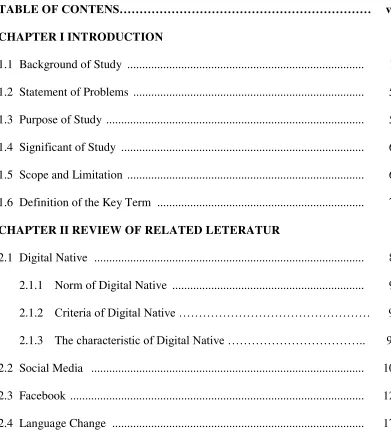THE USED “X”
REPLACING
“NYA” AMONG THE DIGITAL NATIVE
ON FACEBOOK STATUS UPDATE
THESIS
By:
SUNARDI AHMAD
09360003
ENGLISH DEPARTMENT
FACULTY OF TEACHER TRAINING AND EDUCATION
UNIVERSITY OF MUHAMMADIYAH MALANG
THE USED “X”
REPLACING
“NYA” AMONG THE DIGITAL NATIVE
ON FACEBOOK STATUS UPDATE
THESIS
This thesis is submitted to fulfill one of the requirements to achieve Sarjana Degree in
English Education
By:
SUNARDI AHMAD
09360003
ENGLISH DEPARTMENT
FACULTY OF TEACHER TRAINING AND EDUCATION
UNIVERSITY OF MUHAMMADIYAH MALANG
MOTTO AND DEDICATION MOTTO
HAI ORANG-ORANG YANG BERIMAN, JADIKANLAH SABAR DAN SHALAT SEBAGAI PENOLONGMU, SESUNGGUHNYA ALLAH BESERTA ORANG-ORANG
YANG SABAR (AL- BAQARAH 153)
“
HARAM MANYARAH WAJA
SAMPAI KAPUTING
“
Special dedicated for:
-My beloved parents
(Mama Normawati dan Abah Akhmad Riyanto) -My beloved young brother and sister
(Juri and Aulia)
TABLE OF CONTENTS
2.4.1 Kinds of Language Change ... 18
CHAPTER III RESEARCH METHODOLOGY 3.1 Research Design ... 31
3.2 Research Subject ... 32
3.3 Data Instrument ... 33
3.3.1 Observation ... 33
3.3.1.1 Participant as Observer ... 34
3.3.1.2 Observer as Participant ... 34
3.3.1.3 Complete Observer ... 34
3.3.2 Interview ... 35
3.3.2.2 Structured Interview ... 36
3.3.2.3 Semi or Partially Structured Interview ... 36
3.3.2.4 Telephone/Online Interview ... 36
3.4 Data Collection ... 38
3.5 Data Analysis ... 39
CHAPTER IV RESEARCH FINDING AND DISCUSSION 4.1 Finding ... 40
4.1.1 When using “x” replacing “nya” for First time ... 40
4.1.2 The Reason Using “x” replacing “nya” ... 42
4.1.3 Why “x” replacing“nya” among The Digital Native on facebook update status ... 46
4.2 Discussion ... 48
REFERENCES
Ary, Donald. 2002. Introduction to Research in Education, Sixth Edition. Northern Illinois University. Wadsworth Group.
Palmer, Eric. 2011. Visual Learning Styles Among Digital Native. Purdue University. Purduce e-Pubs.
Androutsopoulos, Jannis. 2011. Language Change and Digital Media: a Review of Concept and
evidence. University of Hamburg
Hickey, Raymond. 2001. Language Change. Ensen University
Poedjiastuti, 2008. Culture Shock Experience by Foreign Students Study in Indinesia University. Muhammadiyah University of Malang.
Jones, Chistoper. 2011. The Net Generation and Digital Native. Institute of Educational Technology. Walton Hall, Milton Keynes, MK7 6AA.
Shulman, Myra. 2001. Culture Shock In Contrast. The University of Michigan Press.
Smith. 2002. The Cycle of Cross-Cultural Adaptation and Reentry. The Horizon. MCB University Press
Presnky, Marc. 2001. Digital Native, Digital Imigrans. The Horizon. MCB University Press. Ross, Jenn and Bayne, Slan. 2007. The ‘Digital Native’ and “Digital Immigrant’: a Dangerous
opposition. University of Edinburgh
Helsper, Ellen and Enyon, Rebbecca. 2009. Digital Native: where is the evidence?. British
Zamma, Hideki. 2000. Affixation and Phonological Phenomena: Form Lexical Phonology to
lexical Specification Theory. University of Tsukuba.
Habib, Rania. 2005. The role of social factors, lexical borrowing and speech accommodation in
the variation of [q] and [ʔ ] in the colloquial arabic of rural migrant families in hims,
Syria.Univesity of Florida.
Herring, S. C. 2003. Media and language change: Introduction. Journal of Historical Pragmatics Jucker, A. 2006. Live text commentaries. Read about it while it happens. Germanistische
Linguistik.
Kataoka, K. 2003. Emotion and youth identities in personal letter writing: An analysis of pictorialsigns and unconventional punctuation. In J. Androutsopoulos and A. Georgakopoulou (eds.) Discourse Constructions of Youth Identities. Amsterdam/Philadelpha: Benjamins.
Androutsopoulos, J. 2006. Introduction: Sociolinguistics and computer-mediated communication. Journal of Sociolinguistics 10/4: 419–438.
Androutsopoulos, J. 2007. Neue Medien – neue Schriftlichkeit? Mitteilungen des Deutschen Germanistenverbandes
Androutsopoulos, J. 2009. „Greeklish‟: Transliteration practice and discourse in a setting of computer-mediated digraphia. In A. Georgakopoulou and M. Silk (eds.) Standard
Languageand Language Standards. Farnam: Ashgate.
Androutsopoulos, J. 2010. Localizing the Global on the Participatory Web. In N. Coupland (ed.)
The Handbook of Language and Globalization. Malden, MA: Wiley-Blackwell.
